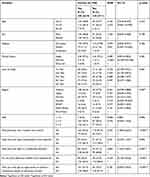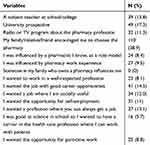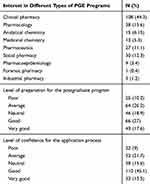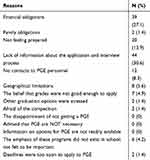Back to Journals » Advances in Medical Education and Practice » Volume 11
Pharmacy Students Motivation, Preparation and Factors Affecting Pursuing Postgraduate Education in Ethiopian University
Authors Woldekidan NA , Mohammed AS , Belachew EA
Received 31 December 2019
Accepted for publication 12 June 2020
Published 26 June 2020 Volume 2020:11 Pages 429—436
DOI https://doi.org/10.2147/AMEP.S244326
Checked for plagiarism Yes
Review by Single anonymous peer review
Peer reviewer comments 2
Editor who approved publication: Dr Md Anwarul Azim Majumder
Nigist Alemayehu Woldekidan,1 Ammas Siraj Mohammed,2 Eyayaw Ashete Belachew1
1Department of Clinical Pharmacy, School of Pharmacy, College of Medicine & Health Sciences, University of Gondar, Gondar, Ethiopia; 2Department of Clinical Pharmacy, College of Medicine and Health Sciences, Haramaya University, Harar, Ethiopia
Correspondence: Nigist Alemayehu Woldekidan
Department of Clinical Pharmacy, School of Pharmacy, College of Medicine & Health Sciences, University of Gondar, P.O. Box: 196, Gondar, Ethiopia
Tel +251 922138255
Email [email protected]
Background: Pharmacy students seek postgraduate education (PGE) to develop their knowledge in a specified field of interest. Postgraduate Master’s programs under the school of pharmacy in Ethiopia include clinical pharmacy, pharmacology, pharmacognosy, medicinal chemistry, pharmaceutical analysis, social pharmacy and administrative pharmacy, and pharmaceutics. This study aims to assess pharmacy student’s motivation to study postgraduate programs and potential barriers to pursue postgraduate education.
Methods: Institutional-based cross-sectional study was conducted on regular pharmacy students of the University of Gondar. A survey was distributed to undergraduate regular pharmacy students from year one to five. PGE interested and non-interested student’s difference in their characteristics was examined using chi-square. Binary Logistic regression was used to examine predictors of pursuing PGE. The study was conducted from February 1 to February 30, 2019.
Results: A total of 388 pharmacy students have participated in the study. More than half 215 (55.4%) of participants were males and in the age group 22– 25, 204 (52.6%). Region (p-0.007), pharmacy as a first choice (p-0.001), experience in a leadership position (p-0.002), previous pharmacy-related work experience (p-0.001), and previous attendance at the conference (p-0.001) have shown statistically significant association with interest to pursue postgraduate education.
Conclusion: Generally, few students rate their level of preparation and level of confidence to apply for PGE at high. Further works including preparing motivational speeches and details on admission requirements for available PGE programs have to be prepared in collaboration with the Ministry of Education (MOE) to enhance students’ interest. Besides, potential development of scholarships for PGE may enhance the ability of some students to apply for PGE, who otherwise would be unable to.
Keywords: pharmacy, motivation, postgraduate education, Gondar
Introduction
Pharmacy is the health profession that is committed to ensuring safe and effective use of medication and it links the health sciences with the basic sciences.1 Pharmacy is among the respected professions worldwide, and it has experienced tremendous developments over the years.2
Nowadays pharmacists’ scope of practice widened from previous dispensing and suppling of medications to a variety of health services straddling prevention, addressing patient needs and expectations. All transition of focus is related to change of health care system, aging populations, health care workforce supply issues, emerging chronic diseases and changing expectations have re-engineered pharmacy in many developed nations.3,4
For advancing pharmacy knowledge in a specific field or area of interest, postgraduate education (PGE) opportunities are the major options for pharmacy students and graduates. Often PGE is needed as a prerequisite for certain employment opportunities as well as to diversify pharmacists’ skills and knowledge within the health care environment.5 Postgraduate education in Ethiopia is popular and it enhances job prospects. Also, there is Higher Education Relevance and Quality Agency (HERQA) which ensures whether higher education curriculum supports the countries’ development needs. Postgraduate Master’s programs under the school of pharmacy in Ethiopia include Clinical Pharmacy, Pharmacology, Pharmacognosy, Medicinal chemistry, Pharmaceutical Analysis, Social pharmacy and administrative pharmacy, and Pharmaceutics. The programs are to be completed within two years, one year is for theory and the other is for research. The theory part of the programs has supplementary courses for the development of academic research and prepare graduates to become an independent researcher.
Choosing pharmacy as an area of specialization after high school graduation may have an impact on following PGE or future areas of the students. The study done by Abdelhadi Nadine et al reported that their choice is related to their desire to work with patients, their desire of profession with a high level of income, and others attracted with its flexible working hours.6 There have been other influential factors which have been reported to affect their choice including their relatives, friends, or teachers, or through career fairs.7 Difference in the selection of pharmacy profession as the first choice between developed and developing countries probably linked to low public awareness and appreciation of pharmacy as a valid health care profession in developing nations.8–10 A review of available literature suggests that the proportion of students who selected pharmacy as their first choice of study ranged from 39–51.1% in Africa11,12 and 71.5% to 77.4% in developed countries, UK and the United States.7,13
Further studies were done to identify influential factors for future engagement in research and academia. Introducing online courses and preparing summer programs has shown remarkable outcomes for students’ future choices. It has been described that these practices have the potential to open the eyes of students to a new window and may show a clear picture of available options.14,15
Student engagement represents the amount of time and effort students devote to their studies as well as the resource allocated by the institution to promote participation in educational activities, has been recommended to help future motivation on learning environment.16
Globally, studies have investigated the reasons and motivations of pharmacy students to study pharmacy6,17 as well as their plans.18,19 In Ethiopia, there was no research done on what motivates pharmacy students to study pharmacy as well as pursuing postgraduate education and factor associated. This study aims to assess Pharmacy student’s motivation to study postgraduate programs and potential barriers to postgraduate education.
Methods and Materials
Study Area, Design and Period
Institutional-based cross-sectional study was conducted on undergraduate regular pharmacy students of the University of Gondar. The study was conducted from February 1–30, 2019.
Inclusion and Exclusion Criteria
All volunteer undergraduate regular pharmacy students attending the bachelor of the pharmacy degree program at the University of Gondar were included in the study.
Population
Undergraduate regular pharmacy students who were attending the bachelor of pharmacy degree program were the study population.
Study Variables
Dependent Variables
Choice of pharmacy as first choice, interest for PGE, previous experience in research, pharmacy-related work experience, previous leadership position, and previous opportunity to attend a conference related to pharmacy school were dependent variables.
Independent
Socio-demographic variables and other characteristics: age, sex, religion, region, marital status, level of study, and GPA.
Data Collection and Management
A structured questionnaire20 for this study was adapted and developed based on previous studies.21,22 The questionnaire involved four main sections. The first part includes Socio-demographic information of students includes age, sex, year of study, religion, and marital status. The second section wanted to assess a student’s motivation and desire to study pharmacy as a first-choice career option. We asked whether pharmacy was the first-choice field of study using a “Yes or No” option. If yes, they were requested to choose from a list of factors that they think inclined their decision the most. The third section of the questionnaire assessed previous experiences of students, by asking them to choose from a list of areas of pharmacy practice. Information like research experience, pharmacy-related work experience, and factors influence interest for PGE were also collected. After explaining the purpose of the study, questionnaires were self-administered to volunteer students. They were allowed to fill the questionnaire within 15 to –20 min and their response was kept confidential.
Data Quality Assurance and Analysis
The pretest was done before the actual data collection on 15 volunteer pharmacy students who were not considered in the final analysis. Content validity and reliability were checked with senior professionals. Content validity was checked by reviewing literature and preparing senior professionals’ panels. The reliability test was done through Cronbach’s alpha, and the score was 7.4. Necessary Correction and modification were instituted based on feedback before commencing the final survey collection. The collected data were cleared, arranged, coded, checked for completeness, and then analyzed by SPSS version 21. Descriptive statistics were used to summarize socio-demographic and other baseline characteristics. Binary-Logistic regression analysis was used to determine the association between variables and P-values were reported as statistically significant if <0.05 or 5%.
Result
Socio-Demographic Characteristics of Study Subjects
The questionnaire was distributed to all undergraduate regular pharmacy students (n=440) and there was a total of 388 pharmacy students who completed the survey (response rate =88.2%). Around two-third of 244 (62.9%) of participants were interested to pursue their postgraduate education. The majority of participants were male 215 (55.4%) and in the age group 22–25, 204 (52.6%). Students studying the first and second years are more interested in postgraduate programs, 60 (24.6%) and 56 (23.9%), respectively (Table 1).
 |
Table 1 Demographics and Background Characteristics of Respondents |
Factors Affecting Interest in Postgraduate Education
The region, pharmacy as a first choice, experience in a leadership position, previous pharmacy-related work, and previous attendance in the conference have shown statistically significant association for the interest of postgraduate education with p-value 0.007, <0.001, 0.002, 0.001, and <0.001, respectively (Table 1).
Those who have pharmacy-related work experience and who have got an opportunity to attend a conference related to pharmacy school have decreased interest for postgraduate education 68%, AOR: 0.32 [0.165–0.620] (Figure 1) and 81.9%, AOR: 0.181[0.093–0.354] (Figure 2), respectively (Table 1).
 |
Figure 1 Influence of previous pharmacy-related work experience on interest for PGE. |
 |
Figure 2 Influence of previous exposure on pharmacy-related conference on interest for PGE. |
On the other hand, those participants who are from Somalia region, who choose pharmacy as number one choice and who have experience in a leadership position were interested in postgraduate program AOR: 3.212[0.209–49.469], AOR: 3.557[1.906–6.637] (Figure 3), and AOR:2.864 [1.454–5.642] (Figure 4), respectively (Table 1).
 |
Figure 3 Influence of choosing pharmacy as a first choice on interest for PGE. |
 |
Figure 4 Influence of previous leadership experience on interest for PGE. |
Previous experience in research does not show a significant association with interest for PGE (p-0.094) (Figure 5).
 |
Figure 5 Influence of previous participation in research on interest for PGE. |
Reasons for Choosing Pharmacy as a First Choice, Pharmacy-Related Work Experience and Confidence for Application and Focus of Interest
Among the reasons for choosing pharmacy as a first choice, family’s/relatives/friend’s encouragement and university perspective are the most selected with 110 (38.9%) and 49 (17.3%), respectively (Table 2). More than half 70 (59.8%) of participants have experience in community pharmacy followed by hospital pharmacy 38 (32.5%) (Table 3). Among postgraduate interested students nearly half of them interested to study clinical pharmacy108 (44.3%) followed by pharmacology 38 (15.6%) and social pharmacy 30 (12.3%). Most of them rate their level of preparation for the program 66 (27%) and level of confidence for the application process110 (45.1%) at good (Table 4).
 |
Table 2 Reason for Choosing Pharmacy as a First Choice (n=283) |
 |
Table 3 Pharmacy-Related Experience (n=117) |
 |
Table 4 The Focus of Interest, and Level of Preparation and Confidence for Application (n=244) |
Reasons for Not Pursuing a Postgraduate Program
Among the reasons for not pursuing a postgraduate program the most selected one is lack of information about the application and interview process 44 (30.6%) followed by financial obligation 39 (27.1%) and not feeling prepared 20 (13.9%) (Table 5).
 |
Table 5 Reasons for Not Pursuing Postgraduate Education (n=144) |
Discussion
This study was conducted to assess the motivation of pharmacy students for postgraduate programs and associated factors that affect their motivation.
Among all participants, more than two-third 283 (72.9%) choose pharmacy as a first choice. Similarly, on studies done in South Jordan and South Africa, the pharmacy has been selected by nearly half of the students as a first choice.7,17 The increased number in our study may be related to the inclusion of students who choose pharmacy other than other health sciences after losing the score which can make them a candidate to enter medicine.
The most selected influential factor to choose pharmacy as the first choice was family’s/relatives/friend’s encouragement 114 (38%). In line with this, another study also shows peer and family influencing a career path of students.7
In our study, the region was significantly associated with interest for PGE, those who come from Somalia region have shown increased interest for PGE (p-0.007). Somali region was performing the worse education than other regions and students coming from Somalia region usually are the most top scorers from the region or they are from a more supportive community23 and commonly they are few (between 0–2 in each batch). So, their interest in PGE may be related to their passion to increase regional educational structure.
In the study, those who choose pharmacy as their number one choice were more interested to follow PGE (p-0.001). This may be linked to the previous awareness about the pharmacy-related courses and previously settled goals which may have a great impact on following PGE. Additionally, a Previous leadership position has been observed to have a positive impact on students to pursue PGE (p-0.002). Motivation is typically believed to be affected by a combination of individual and contextual factors. Here, previous leadership experience may be a powerful contextual factor for their motivation to study PGE.24
Previous pharmacy-related work was among the factors that were associated with decreased interest for PGE (p-0.001). As we observed on the result part most of the participants have community pharmacy 70 (59.8%) and hospital pharmacy38 (32.5%) work experience which can attract participants to the market place or business, and students practice site may determine which practice settings they might like to enter in the future.25
Furthermore, those students who attend pharmacy-related conferences have shown decreased interest for PGE (p-0.001).On the contrary, the study conducted in the USA has shown, increased interest of students who have ever attended pharmacy-related conferences.22 This may be because, on the conference, they may get informed about the challenges they will have on following their PGE including financial requirements and country (region) of the institution where PGE will be followed. Following PGE in the higher institution is more difficult for students who did not get any scholarship opportunity to cover their financial requirements.26
Among postgraduate interested students nearly half 108 (44.3%) of them have been interested to study clinical pharmacy. Another study conducted in Ethiopia shows student’s interest in hospital pharmacy.12 Furthermore, a study conducted in the United Arab Emirates shows similar interest, and students' passion for helping people and being interested in science were observed as key motivators.27
Most of them rate their level of preparation for the program 66 (27%) and level of confidence for the application process110 (45.1%) at good. Providing information about PGE may have an impact to increase the level of confidence on preparation as well as on application process for PGE.28,29
Among the reasons for not pursuing a postgraduate program the most depicted was lack of information about the application and interview process 44 (30.6%). On the other hand, financial obligation 39 (27.1%) was the second reason for not pursuing a PGE which was also the major reason in other studies.22,30
Study Limitations
As the study is done only in one institute, the results of this study may not be generalizable to other areas of the country. Besides, the survey fails to deeply assess the reason for student’s interest and non-interest for PGE.
Conclusion
Generally, PGE is mandatory to develop knowledge in a specified field of study. The region, pharmacy as a first choice, experience in a leadership position, previous pharmacy-related work, and previous attendance in the conference have shown statistically significant association with interest to follow PGE. Further works including preparing motivational speeches and details on admission requirements about available PGE programs has to be prepared in collaboration with the Ministry of Education (MOE) to enhance students’ interest. Besides, the potential development of scholarships for PGE may enhance the ability of some students to apply for PGE, who otherwise would be unable to.
Abbreviations
AOR, adjusted odds ratio; COR, crude odd ratio; GPA, grade point average; MOE, Ministry of Education; PGE, postgraduate education; SPSS, Statistical Package for the Social Sciences; TV, television; UK, United Kingdom; USA, United States of America; UOG, University of Gondar.
Data Sharing Statement
The corresponding author has all materials and data of this study and it is available upon request.
Ethical Declaration and Informed Consent
Ethical clearance was obtained from the School of Pharmacy, University of Gondar research, and the ethics committee before the commencement of the study. Verbal informed consent was obtained and it was acceptable and approved by the School of Pharmacy, University of Gondar Research and Ethics Committee.
Author Contributions
All authors made substantial contributions to conception and design, acquisition of data, or analysis and interpretation of data; took part in drafting the article or revising it critically for important intellectual content; gave final approval of the version to be published; have agreed on the journal to which the article has been submitted; and agree to be accountable for all aspects of the work.
Disclosure
The authors declared that they have no competing interests.
References
1. Tumkur A, Muragundi P, Shetty R, Naik A. Pharmaceutical care: need of the hour in India. J Young Pharm. 2012;4(4):282–286. doi:10.4103/0975-1483.104374
2. Pearson GJ. Evolution in the practice of pharmacy – not a revolution! CMAJ. 2007;176(9):1295–1296. doi:10.1503/cmaj.070041
3. National Health care Agreement. Council of Australian Governments; 2012. Available from: http://www.federalfinancialrelations.gov.au/content/npa/health/_archive/healthcare_national-agreement.pdf.
4. Morrison CM, Glover D, Gilchrist SM, et al. Partnering with Pharmacists in the Prevention and Control of Chronic Diseases. Atlanta Clifton Road NE: National Center for Chronic Disease Prevention and Health Promotion; 2012.
5. American Society of Hospital Pharmacists. Definitions of pharmacy residencies and fellowships. Am J Hosp Pharm. 1987;44(5):1142–1144.
6. Abdelhadi NN, Mayyada Wazaify FW, Elhajji D, Basheti IA. Doctor of Pharmacy in Jordan: Students’ Career Choices, Perceptions and Expectations. SET Publisher; 2014. doi:10.6000/1927-5951.2014.04.03.7
7. Anderson DC, Sheffield MC, Hill AM, Cobb HH. Influences on pharmacy students’ decision to pursue a doctor of pharmacy degree. Am J Pharm Educ. 2008;72(2):22. doi:10.5688/aj720222
8. Smith F. Community pharmacy in Ghana: enhancing the contribution to primary health care. Health Policy Plan. 2004;19(4):234–241. doi:10.1093/heapol/czh028
9. Oparah AC, Kikanme LC. Consumer satisfaction with community pharmacies in Warri, Nigeria. Res Social Adm Pharm. 2006;2(4):499–511. doi:10.1016/j.sapharm.2006.02.004
10. Azhar S, Hassali MA, Ibrahim MIM, Ahmad M, Masood I, Shafie AA. The role of pharmacists in developing countries: the current scenario in Pakistan. Hum Resour Health. 2009;7:54. doi:10.1186/1478-4491-7-54
11. Modipa S, Dambisya Y. Profile and career preferences of pharmacy students at the University of Limpopo, Turfloop Campus, South Africa. Educ Health. 2008;21:164.
12. Gebretekle G, Ebro M, Ageze H, Atsbeha B, Wubishet BL, Tilahun G. Pharmacy students’ attitude and future career choices: a survey of four public schools of pharmacy in Ethiopia. Ethiopian Pharma J. 2014;30(1):57–63. doi:10.4314/epj.v30i1.6
13. Wilson K, Jesson J, Langley C, Hatfield K, Clarke L. Pharmacy Undergraduate Students: Career Choices and Expectations Across a Career Choices and Expectations Across a Four-Year Degree Programme. London (UK): Royal Pharmaceutical Society; 2006.
14. Johnson JA, Moore MJ, Shin J, Frye RF. A summer research training program to foster PharmD students’ interest in research. Am J Pharm Educ. 2008;72(2):23. doi:10.5688/aj720223
15. Baia P, Strang A. An elective course to promote academic pharmacy as a career. Am J Pharm Educ. 2012;76(2):30. doi:10.5688/ajpe76230
16. Oyler D, Romanelli F, Piascik P, Cain J. Practical insights for the pharmacist educator on student engagement. Am J Pharm Educ. 2016;80.
17. Truter I. Motivation and career prospects of pharmacy students at Nelson Mandela Metropolitan University: a preliminary study. Jordan J Pharm Sci. 2009;2(2):159e166.
18. Bardick A, Bernes K, Magnusson K, Witko K. Junior high school students’ career plans for the future – a Canadian perspective. J Career Dev. 2006;32(3):250–271. doi:10.1177/0894845305279168
19. Savage LM, Beall JW, Woolley TW. Factors that influence the career goals of pharmacy students. Am J Pharm Educ. 2009;73(2):28. doi:10.5688/aj730228
20. Structured questionnaire for assessing pharmacy students motivation, preparation and factors affecting pursuing post-graduate education. Supplement.pdf. 2020.
21. Alhaddad MS. Undergraduate pharmacy students’ motivations, satisfaction levels, and future career plans. J Taibah Univ Sci. 2018;13(3):247–253. doi:10.1016/j.jtumed.2018.03.004
22. Patel I, Guy JW, Han Y, Paraoan J, Marsh W, Johnson MS. Pharmacy student awareness, aspiration, and preparation for post-graduate education (PGE) fellowship in US: a cross-sectional study. Curr Pharm Teach Learn. 2018;10(8):1055–1061. doi:10.1016/j.cptl.2018.05.006
23. Jackson. E. Feinstein International Center: The Role of Education in Livelihoods in the Somali Region of Ethiopia. Medford(MA): Feinstein International center; 2011.
24. Harrell MM. The Relationships Between Leader Behavior, Follower Motivation, and Performance. Florida: Departement of Psychology College of the Sciences University of Central Florida; 2008.
25. Shea J. A student’s reflection on the co-op experience. Can Pharm J (Ott). 2012;145(2):96–97. doi:10.3821/145.2.cpj96
26. Russo G. Education: financial burden. Nature. 2013;501(7468):579–581. doi:10.1038/nj7468-579a
27. James PB, Batema MNP, Bah AJ, et al. Was pharmacy their preferred choice? Assessing pharmacy students’ motivation to study pharmacy, attitudes and future career intentions in Sierra Leone. Health Prof Educ. 2018;4(2):139–148. doi:10.1016/j.hpe.2017.06.001
28. Sholy L, Zeenny R. A career exploration assignment for first-year pharmacy students. Am J Pharm Educ. 2013;77(9):195. doi:10.5688/ajpe779195
29. Hartman R, Blustein L, Morel D, Davis L. A pharmaceutical industry elective course on practice experience selection and fellowship pursuit by pharmacy students. Am J Pharm Educ. 2014;78(6):126. doi:10.5688/ajpe786126
30. Bucci KK, Knapp KK, Ohri LK, Brooks PJ. Factors motivating pharmacy students to pursue residency and fellowship training. Am J Health Sys Pharm. 1995;52(23):2696–2701. doi:10.1093/ajhp/52.23.2696
 © 2020 The Author(s). This work is published and licensed by Dove Medical Press Limited. The full terms of this license are available at https://www.dovepress.com/terms.php and incorporate the Creative Commons Attribution - Non Commercial (unported, v3.0) License.
By accessing the work you hereby accept the Terms. Non-commercial uses of the work are permitted without any further permission from Dove Medical Press Limited, provided the work is properly attributed. For permission for commercial use of this work, please see paragraphs 4.2 and 5 of our Terms.
© 2020 The Author(s). This work is published and licensed by Dove Medical Press Limited. The full terms of this license are available at https://www.dovepress.com/terms.php and incorporate the Creative Commons Attribution - Non Commercial (unported, v3.0) License.
By accessing the work you hereby accept the Terms. Non-commercial uses of the work are permitted without any further permission from Dove Medical Press Limited, provided the work is properly attributed. For permission for commercial use of this work, please see paragraphs 4.2 and 5 of our Terms.
